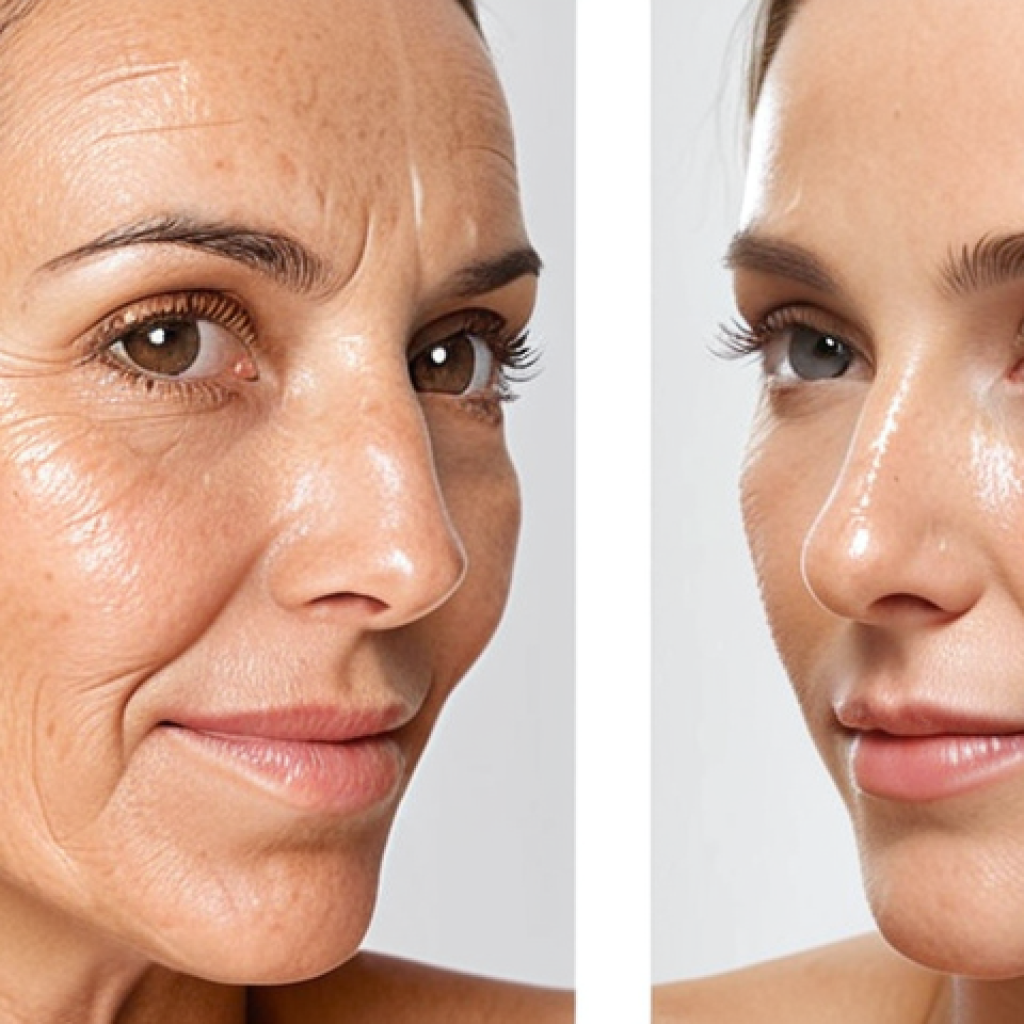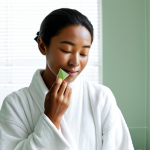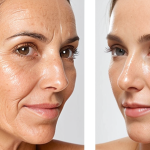As I’ve gotten older, I’ve noticed my skin isn’t quite as bouncy as it used to be. Fine lines are starting to creep in, and my complexion just doesn’t have that youthful glow.
I’ve been on the hunt for a decent collagen cream that actually makes a difference. The market is flooded with them, but finding one that delivers on its promises?
That’s the real challenge. It’s been predicted that the collagen skincare market will continue to boom as people seek non-invasive ways to fight aging.
What ingredients are actually effective, and how do you ensure you’re getting your money’s worth? Let’s dive in and discover more precise information in the article below!
Alright, let’s get this blog post cooking!
Decoding Collagen Creams: What Really Works?

Collagen creams, oh, the promises they whisper! I remember grabbing one a few years back, lured in by the words “youthful radiance” plastered across the jar.
I religiously slathered it on, hoping to turn back the clock. Did I suddenly look like I was 20 again? Nope.
But that experience did make me start digging deeper into what actually works in these creams. It’s not as simple as just slapping on any old collagen product.
The science behind skincare ingredients is complex, and it’s easy to fall for marketing hype. For instance, some creams boast about high collagen content, but the collagen molecules are often too large to penetrate the skin.
It’s like trying to shove an elephant through a keyhole! We need to be smarter consumers, understanding what to look for beyond the catchy phrases and celebrity endorsements.
What ingredients actually stimulate collagen production, and how do we ensure they’re delivered effectively to our skin? It’s a quest, I tell you, a quest for that elusive fountain of youth (or at least, the appearance of it!).
Understanding Collagen’s Role
Collagen isn’t just some buzzword skincare companies throw around. It’s a protein naturally produced by our bodies, acting as the scaffolding that keeps our skin firm and elastic.
Think of it as the springs in your mattress, keeping everything plump and supported. As we age, collagen production slows down, which is why we start seeing wrinkles and sagging.
It’s a natural process, but that doesn’t mean we have to sit back and accept it! Factors like sun exposure, pollution, and even stress can accelerate collagen breakdown.
So, while a collagen cream alone might not be a miracle worker, understanding how collagen works is the first step in creating a skincare routine that actually addresses the root cause of aging.
I’ve found that incorporating collagen-boosting ingredients along with a healthy lifestyle makes a real difference in how my skin looks and feels.
Navigating the Ingredient Jungle
Okay, so you’re standing in the skincare aisle, overwhelmed by a sea of products. How do you cut through the noise and find a collagen cream that’s worth your hard-earned cash?
Start by looking beyond the word “collagen” itself. Focus on ingredients that stimulate collagen production, like peptides and retinoids. Peptides are like little messengers that signal your skin to produce more collagen.
Retinoids, derived from vitamin A, boost collagen production and improve skin cell turnover. Vitamin C is another powerhouse ingredient that not only helps produce collagen but also protects your skin from free radical damage.
I always check the ingredient list for these key players. And don’t be afraid to do some research! Websites like Paula’s Choice and the Environmental Working Group’s Skin Deep database can provide valuable information on ingredient safety and efficacy.
Peptides: The Collagen Catalysts
Peptides are short chains of amino acids that act as building blocks for proteins like collagen and elastin. Think of them as tiny construction workers that signal your skin cells to produce more of these essential proteins.
But not all peptides are created equal. Different peptides have different functions, so it’s important to choose products that contain peptides specifically designed to boost collagen production.
For example, Matrixyl and Argireline are two popular peptides known for their anti-aging benefits. I’ve personally had good results with products containing Matrixyl, noticing a visible improvement in the firmness of my skin.
The key is consistency. Peptides need time to work their magic, so don’t expect overnight results. Be patient, and use peptide-rich products as part of your daily skincare routine.
Decoding Peptide Lingo
When scanning ingredient lists, you might see terms like “palmitoyl pentapeptide-4” or “acetyl hexapeptide-8.” These are just fancy names for different types of peptides.
Don’t let the jargon intimidate you! A quick Google search can usually provide more information about the specific function of each peptide. I find it helpful to keep a running list of effective peptides that I know my skin responds well to.
This makes it easier to identify promising products and avoid those that are likely to be ineffective.
Pairing Peptides for Power
Peptides work even better when combined with other collagen-boosting ingredients. For example, using a peptide serum in conjunction with a retinoid cream can amplify the anti-aging benefits.
Vitamin C also plays a crucial role in collagen synthesis, so incorporating a vitamin C serum into your routine is a smart move. I like to think of it as creating a synergistic effect, where the combined benefits of multiple ingredients outweigh the sum of their individual effects.
It’s like assembling a team of superheroes, each with their unique powers, working together to fight the forces of aging!
Retinoids: The Gold Standard for Anti-Aging
Retinoids are vitamin A derivatives that have been proven to boost collagen production, reduce wrinkles, and improve skin texture. They’re often considered the gold standard for anti-aging skincare, and for good reason.
Retinoids work by stimulating cell turnover, which helps to shed dead skin cells and reveal newer, healthier skin underneath. They also help to thicken the epidermis, the outer layer of the skin, which can improve its overall appearance and resilience.
I remember the first time I tried a retinoid cream. My skin went through a period of adjustment, with some initial redness and peeling. But after a few weeks, I started to see a noticeable improvement in the clarity and smoothness of my skin.
It was well worth the initial discomfort!
Choosing the Right Retinoid
Retinoids come in various forms, ranging from over-the-counter retinol to prescription-strength tretinoin. Retinol is a weaker form of retinoid that is gradually converted into retinoic acid in the skin.
Tretinoin, on the other hand, is a more potent form of retinoic acid that is directly active on the skin. If you’re new to retinoids, it’s best to start with a low-concentration retinol product and gradually increase the strength as your skin becomes more tolerant.
I always recommend consulting with a dermatologist to determine the right retinoid for your skin type and concerns.
Retinoid Safety and Usage
Retinoids can cause dryness, redness, and peeling, especially when you first start using them. It’s important to use them sparingly and to moisturize regularly.
I like to apply my retinoid cream at night, followed by a hydrating moisturizer. It’s also crucial to wear sunscreen during the day, as retinoids can make your skin more sensitive to the sun.
Remember, consistency is key when it comes to retinoids. It can take several weeks or even months to see noticeable results, so be patient and stick with your routine.
Vitamin C: The Antioxidant Powerhouse
Vitamin C is a potent antioxidant that protects the skin from free radical damage, which can contribute to collagen breakdown. It also plays a vital role in collagen synthesis, helping to strengthen and stabilize collagen fibers.
Vitamin C comes in various forms, with L-ascorbic acid being the most effective but also the most unstable. Other forms of vitamin C, such as magnesium ascorbyl phosphate and sodium ascorbyl phosphate, are more stable and less irritating to the skin.
I personally prefer vitamin C serums with a concentration of 10-20%, as I find them to be effective without causing excessive irritation.
Maximizing Vitamin C Benefits
To maximize the benefits of vitamin C, it’s important to store your serum in a cool, dark place to prevent oxidation. You should also apply it to clean, dry skin before other skincare products.
I like to follow my vitamin C serum with a moisturizer and sunscreen. And don’t forget to patch test new products before applying them to your entire face, especially if you have sensitive skin.
Vitamin C Synergies
Vitamin C works well with other antioxidants, such as vitamin E and ferulic acid. These ingredients can enhance the antioxidant effects of vitamin C and provide additional protection against free radical damage.
I look for serums that contain a combination of these ingredients, as I believe they offer the most comprehensive antioxidant protection.
Other Ingredients to Look For
While peptides, retinoids, and vitamin C are the main collagen-boosting ingredients to look for in a cream, there are other ingredients that can support skin health and improve the overall appearance of your complexion.
Hyaluronic acid, for example, is a humectant that attracts moisture to the skin, keeping it hydrated and plump. Niacinamide is a form of vitamin B3 that can help to improve skin tone, reduce redness, and minimize the appearance of pores.
Ceramides are lipids that help to strengthen the skin barrier, preventing moisture loss and protecting against environmental damage. I always aim for a well-rounded skincare routine that incorporates a variety of beneficial ingredients.
Hydration Heroes
Dehydrated skin is more prone to wrinkles and fine lines. That’s where hydrating ingredients like hyaluronic acid and glycerin come in. Hyaluronic acid can hold up to 1000 times its weight in water, making it an excellent humectant.
Glycerin is another effective humectant that draws moisture from the air into the skin. I make sure to incorporate hydrating serums and moisturizers into my routine, especially during the dry winter months.
Skin Barrier Supporters
A healthy skin barrier is essential for maintaining optimal skin health. Ingredients like ceramides and fatty acids can help to strengthen the skin barrier, preventing moisture loss and protecting against environmental aggressors.
I look for moisturizers that contain these ingredients, as they help to keep my skin hydrated, smooth, and resilient.
Lifestyle Factors for Collagen Production
While skincare products can play a significant role in boosting collagen production, it’s important to remember that lifestyle factors also have a major impact on skin health.
A healthy diet, regular exercise, and adequate sleep can all contribute to collagen production and overall skin radiance. Conversely, smoking, excessive sun exposure, and stress can accelerate collagen breakdown and lead to premature aging.
Nutrition for Your Skin
A diet rich in antioxidants, vitamins, and minerals can help to support collagen production and protect the skin from damage. Foods like berries, leafy greens, and fatty fish are excellent sources of these nutrients.
I also make sure to drink plenty of water to keep my skin hydrated from the inside out.
Sun Protection is Key
Sun exposure is one of the biggest culprits when it comes to collagen breakdown. Wearing sunscreen every day, even on cloudy days, is essential for protecting your skin from harmful UV rays.
I opt for a broad-spectrum sunscreen with an SPF of 30 or higher. Here’s a quick reference table:
| Ingredient | Benefits | How to Use |
|---|---|---|
| Peptides | Stimulate collagen production | Apply serum or cream daily |
| Retinoids | Boost collagen, reduce wrinkles | Use at night, start with low concentration |
| Vitamin C | Antioxidant, aids collagen synthesis | Apply serum in the morning |
| Hyaluronic Acid | Hydrates and plumps skin | Apply serum or moisturizer daily |
I hope this information helps you navigate the world of collagen creams and find products that truly work for your skin!
Wrapping Up
So there you have it – a deep dive into the world of collagen creams! It’s definitely a journey of trial and error, but armed with the right knowledge and a little patience, you can find products that work for you. Remember to focus on collagen-boosting ingredients, protect your skin from the sun, and maintain a healthy lifestyle. Your skin will thank you for it!
Handy Tips to Keep in Mind
1. Always patch test a new product before applying it to your entire face. This will help you identify any potential allergic reactions or sensitivities.
2. Be patient! Skincare takes time, and you won’t see results overnight. Give your products at least a few weeks to work their magic.
3. Consistency is key. Stick to your skincare routine, even when you’re tired or busy.
4. Don’t be afraid to experiment and find what works best for your skin. Everyone’s skin is different, so what works for one person may not work for another.
5. Consult with a dermatologist if you have any concerns or questions about your skin.
Key Takeaways
Focus on Collagen-Boosting Ingredients: Look for peptides, retinoids, and Vitamin C in your skincare products.
Protect Your Skin: Sunscreen is non-negotiable. Use it every day, rain or shine.
Consistency is Crucial: Stick to your skincare routine for best results.
Lifestyle Matters: A healthy diet and adequate sleep contribute to radiant skin.
Consult a Professional: If you’re unsure, a dermatologist can provide personalized advice.
Frequently Asked Questions (FAQ) 📖
Q: With so many collagen creams on the market, how can I tell if one is actually worth the investment?
A: Okay, so listen, I’ve been burned by this before. The key is to look past the fancy marketing and focus on the ingredients list. Things like peptides (especially Matrixyl or Argireline), retinol, Vitamin C, and hyaluronic acid are your friends.
These ingredients actually support collagen production or help your skin use it more effectively. Also, check reviews from real people! I always look for before-and-after photos – those speak volumes.
If a cream is promising miracles without any real evidence, steer clear. Trust me, I’ve learned the hard way.
Q: I’ve heard that collagen molecules are too big to be absorbed by the skin. Is using a collagen cream even effective?
A: That’s a really common concern, and honestly, it’s a valid one. Directly applying collagen to your skin won’t magically replenish what’s lost. The collagen molecules are quite large.
However, high-quality creams focus on stimulating your skin’s own collagen production. Ingredients like peptides signal to your skin to produce more collagen.
Think of it like this: the cream isn’t directly giving you collagen, but it’s like a personal trainer for your skin cells, encouraging them to work harder.
It’s not a quick fix, but with consistent use, it can make a difference. I noticed a slight improvement in my skin’s elasticity after a few months of using a cream with peptides.
Q: Besides creams, are there other ways to boost collagen production in my skin naturally?
A: Absolutely! Creams are just one piece of the puzzle. Your diet plays a huge role.
Make sure you’re getting enough protein, as it’s the building block for collagen. Bone broth is also rumored to be beneficial, though I’m still on the fence about that one myself.
Also, protect your skin from the sun! Sun damage breaks down collagen, undoing all your hard work. I wear sunscreen religiously – even on cloudy days.
You could also consider supplements like Vitamin C, which is essential for collagen synthesis. Just remember to talk to your doctor before starting any new supplements.
Maintaining a healthy lifestyle – good sleep, less stress, and a balanced diet – makes a noticeable difference in the long run. I’ve found that a combination of these approaches works best for me.
📚 References
Wikipedia Encyclopedia
구글 검색 결과
구글 검색 결과
구글 검색 결과
구글 검색 결과
구글 검색 결과


